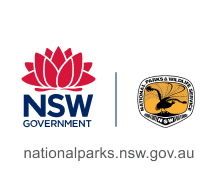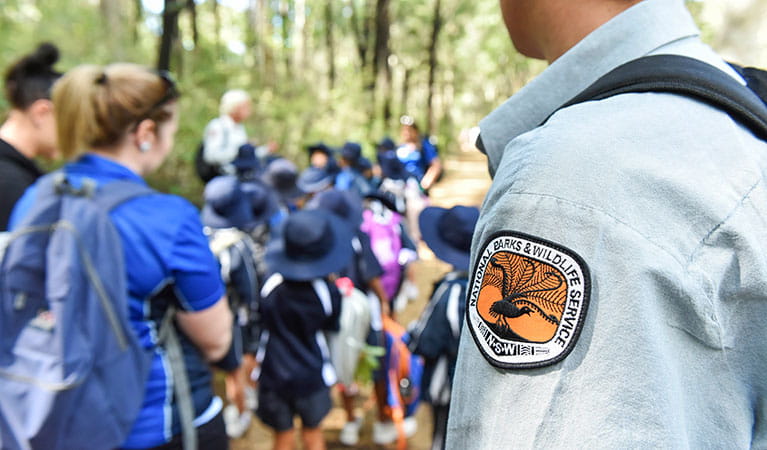School excursion
The earth's environment
Towarri National Park
Affected by closures, check current alerts
Overview
Did you know that over 10 per cent of NSW is a national park? That’s over 7 million hectares. This Stage 2 (Years 3-4) earth’s environment Geography excursion is delivered at Towarri National Park.
Read more about The earth's environment
Students will go for a walk along the banks of Middle Brook to Washpools waterhole. They’ll observe the high diversity of plant species and changing ecosystems from the forest floor to the mountaintops. Washpools is a natural waterhole, making it a great place to undertake nature surveys.
As students explore, they’ll come to understand the important role of workers in a national park. Through investigation and discussion, they’ll discover how they can help to conserve and protect these special places.
We’ll look at some of the key, human-led threats to native species and places including urbanisation and domestic pests. By examining these threats we’ll invoke a strong sense of the role students – our future environmental leaders – can play in preserving these important places for the future.
For program outline, safety and practical information about this excursion, see info for teachers
| Stage | Stage 2 (Years 3-4) |
|---|---|
| Learning area | Geography |
| Student outcomes |
GE2-1. Examines features and characteristics of places and environments GE2-2. Describes the ways people, places and environments interact GE2-3. Examines differing perceptions about the management of places and environments GE2-4. Acquires and communicates geographical information using geographical tools for inquiry |
| Objectives |
Students will:
|
Excursion details
- When
Monday to Friday during school terms.
- Availability
- Guided. Available on request.
- Duration
- 4hrs
- Grading
- Medium. Guided tour and activities on an undulating, unsealed fire trail, along a creek bed, amongst leaf litter on the forest floor and along an unsealed walking path.
- Price
-
$10 per student.
- Accessibility
- No wheelchair access
- Meeting point
- Washpools picnic area and viewing platform in Towarri National Park.
- Equipment
provided - Yes
- Booking
- If you would like to organise a NPWS school excursion please get in touch with local staff or use the 'Enquire' link for the online form.
Local alerts
For the latest updates on fires, closures and other alerts in this area, see https://www.nationalparks.nsw.gov.au/education/stage-2-geography-earths-environment-towarri-national-park/local-alerts
Operated by
- School excursion inquiries - Newcastle Hunter
- 02 4927 3267
- discovery.newcastlehunter@environment.nsw.gov.au
- Hunter Wetland Centre, Sandgate Road, Shortland NSW
Park info
- in Towarri National Park in the Country NSW region
Towarri National Park is always open but may have to close at times due to poor weather or fire danger
Info for teachers
All the practical information you need to know about The earth's environment.
Program outline
- Welcome, introductions, safety briefing and acknowledgement of Country
- Bushwalk investigating creek environment
- Morning tea
- Bushwalk and nature survey
- Lunch
- Role play looking at different jobs in NSW National Parks and Wildlife Service
- Conclusion and farewell
Getting there and parking
From Scone, take Middlebrook Road and drive for 20km to Washpools picnic area. The last 7km of this road is unsealed.
Road quality
- Unsealed roads
Vehicle access
- 2WD vehicles
Weather restrictions
- All weather
Parking
There's a gravel carpark at Washpools picnic area and viewing platform.
What to bring
Please wear long pants, closed comfortable shoes and bring a hat and sunscreen. Be ready for all weather conditions with a jumper and raincoat. And remember to bring food and any necessary medications.
It’s a good idea to pack your belongings in a backpack rather than a plastic bag because we have some curious birds who may try to break in and share your lunch with you.
Maps and downloads
Risk assessment and risk benefits
Our rangers and guides have the technical skill and experience to assess the risks and the benefits of a variety of activities delivered as part of our learning programs.
We believe in including opportunities that allow students to learn and experience for themselves through exploration in the natural environment.
Please make your own risk assessment based on the information provided. Detailed potential risks and controls are provided for the site to assist teachers in risk management planning. Teachers and carers should be aware of, and consider the needs, abilities and medical conditions of students when visiting this site. The supervision of students remains the responsibility of the teacher. The school must ensure an adequate number of adult supervisors are present.

